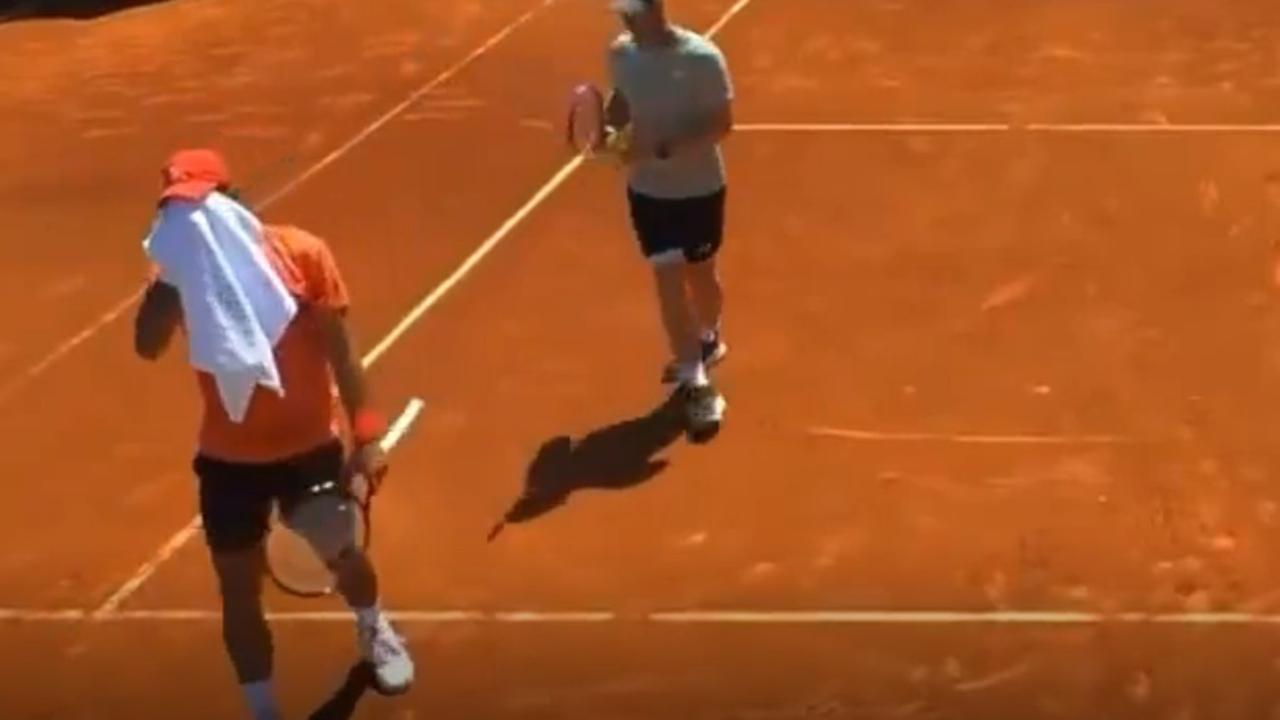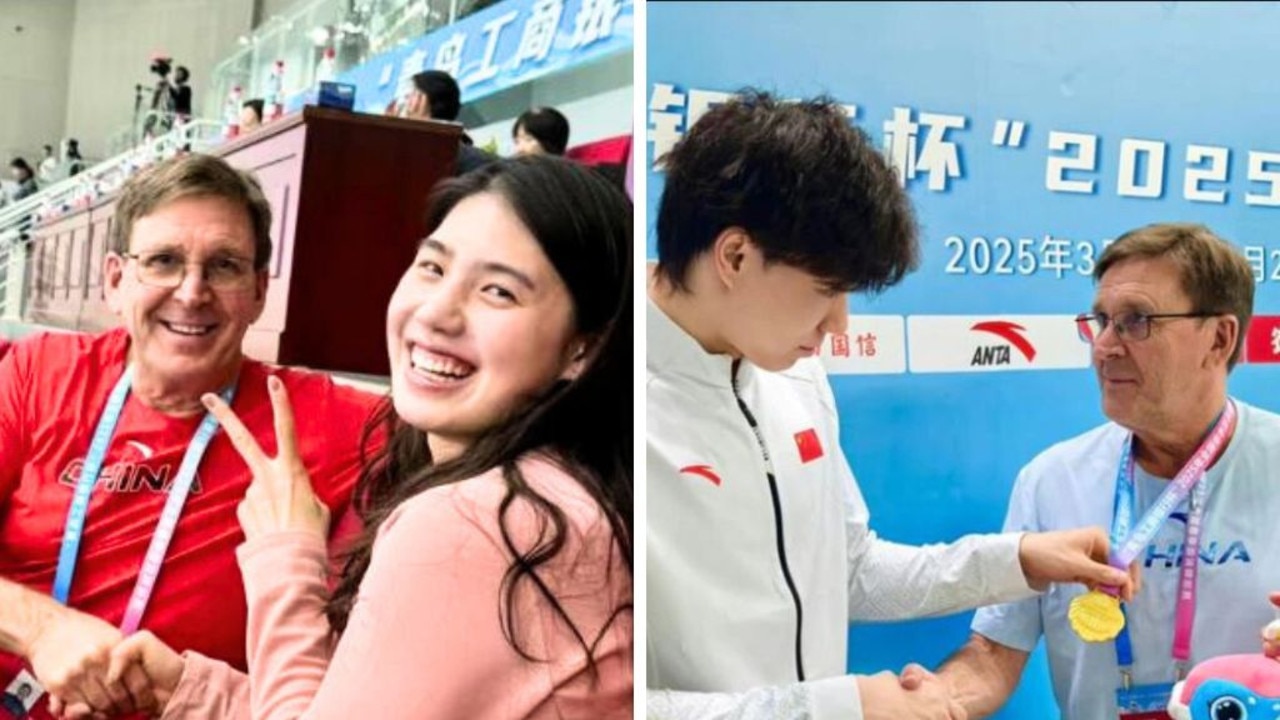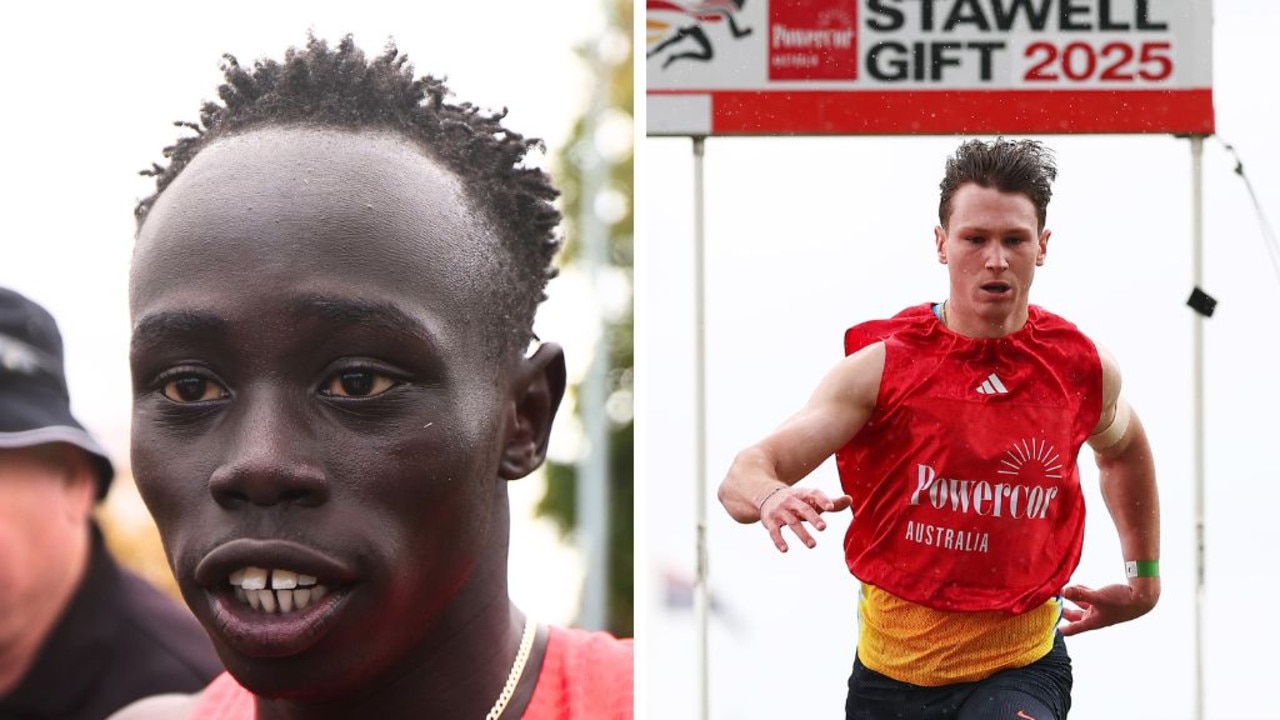Michael Phelps has Ian Thorpe to thank for turning him into the swimmer he is today
BEFORE Michael Phelps could become the greatest Olympian in history, he had to become the world’s best swimmer. He went about it in a strange way.
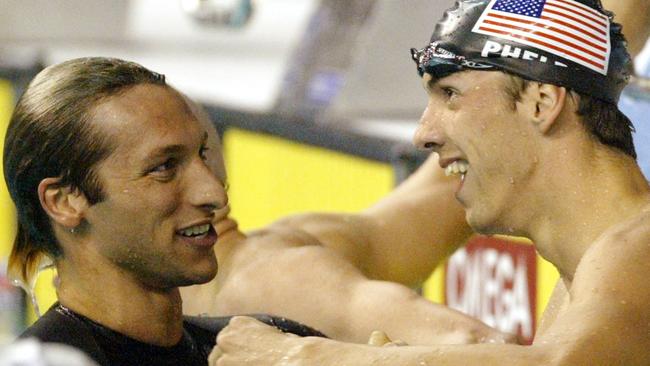
BEFORE Michael Phelps could become the greatest Olympian in history, he had to become the number one swimmer on the planet.
When the 18-time gold medal-winning American first began to make his mark on the world scene, that meant challenging one man.
There was no bigger fish around the turn of the century than Australian freestyle king Ian Thorpe. If Phelps was going to fulfil his ambition of breaking compatriot Mark Spitz’s record of seven gold medals in one Games, he’d have to be able to take out the Thorpedo in the 200m free.
So began a secret obsession with everything the Aussie said and did.
THE MAN
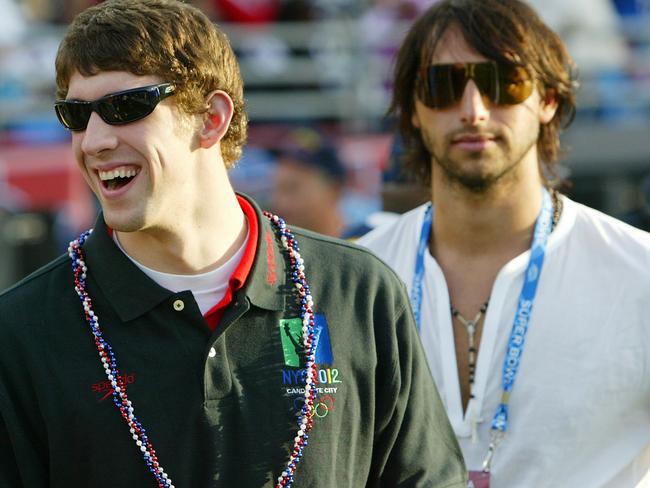
During the early stages of his career, Phelps not only envied Thorpe’s ability in the pool but also his public image and his ability to convert it into sponsorship dollars.
“While Ian was magnificent in the pool, he was a study in how to behave out of it,” wrote Phelps, in his 2008 book No Limits: The Will to Succeed.
“What composure. At a press conference in Fukuoka (during the 2001 world championships), he was asked if he could recite words he had learned in Japanese; he responded with a list of about 30, the list including words and phrases that weren’t related to each other. The follow-up question came: could he recite the same list in English? Ian did so, just as he had done in Japanese, not making even a single slip in the sequence.”
As a wide-eyed 15-year-old competing in his first Olympics in Sydney in 2000, Phelps was left with a lasting impression of Thorpe’s massive profile. “You couldn’t cross the street, it seemed, without seeing Ian’s face on a billboard, couldn’t watch television without seeing Ian in a commercial.”
Phelps noted how Thorpe dealt with questions about the hype and attention surrounding his career. “You can look at it as a negative, as pressure,” Thorpe would say. “Or you can look at it as a positive, as support.”
He began parroting the lines in his own interviews and mimicked the way Thorpe held his hands and where he looked while speaking to reporters.
Even things like the Sydneysider’s famous habit of singing the last song he heard in the car on the way to the pool in his head as a way to alleviate boredom during practice laps became part of Phelps’ routine.
“There was a lot I could learn from Ian Thorpe, the least of which had to do with swimming,” the Maryland native wrote. “I have always looked up to Michael Jordan, the way he changed his sport, just the way I want to help change swimming. Ian, in Australia, was like Michael Jordan. The man.”
Phelps’ fascination with Thorpe was shared by his long-time coach Bob Bowman. Bowman kept a framed photograph of Thorpe touching the wall when he set a world record in the 400m freestyle at the Sydney Olympics in a place of honour over his piano and “unabashedly used Ian as a model for my development”, Phelps revealed.
THE PERCEIVED SLIGHTS
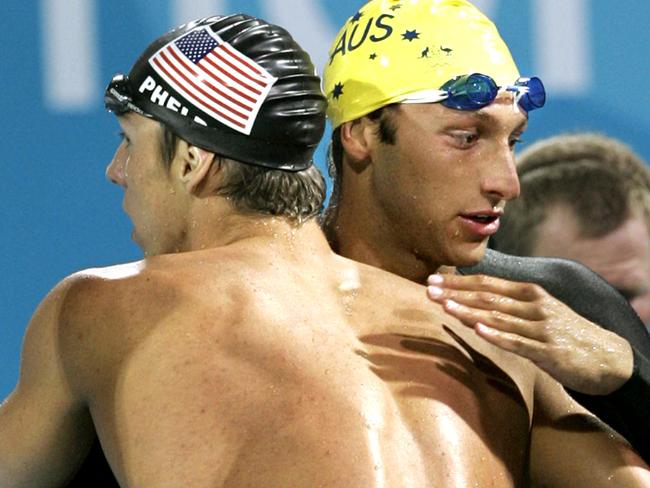
Phelps is a competitor at his core — one who would search for any motivation to fuel his chase for glory. Ahead of his tilt at eight gold medals in Beijing, he took note every time Thorpe was asked about the endeavour.
When Thorpe’s predictions were less than favourable, he had the inspiration he needed. “I don’t think he will do it but I’d love to see it,” Thorpe had said. “There’s a thing called competition. It won’t just be one athlete that will be competing, and in a lot of events he has a lot of strong competition.”
Phelps pinned the quotes in his locker. “Every day when I’d open that locker, it was the first thing I’d see, that article, Ian’s words, dangling there. Every day when I’d close that locker door, that fluttering piece of paper served as a reminder of the many doubters.”
Thorpe repeated the message on the eve of the Games in 2008. “I have said before that I don’t think he (Phelps) can do the eight, and still believe that. Mind you, if there is any person on the planet, who is capable, it is him. It’s sad, but I just don’t think it will happen.”
But he wasn’t the only one providing ammunition. Australian swimming coach Don Talbot defended Thorpe’s mantle as the world’s best swimmer regularly through the early 2000s and it’s clear in his book Phelps heard every word.
In 2002, Thorpe invited Phelps to train with him in Australia, and Bowman spent “a fair amount of time over the next six months trying to coordinate flights, pool times, training schedules, even an appearance at a training clinic in Australia”.
A week before the pair were scheduled to fly out, Thorpe’s coach, Tracy Menzies, emailed to call it off. “This was a major disappointment,” wrote Phelps, who still flew Down Under and trained with Grant Hackett instead.
THE TECHNIQUE
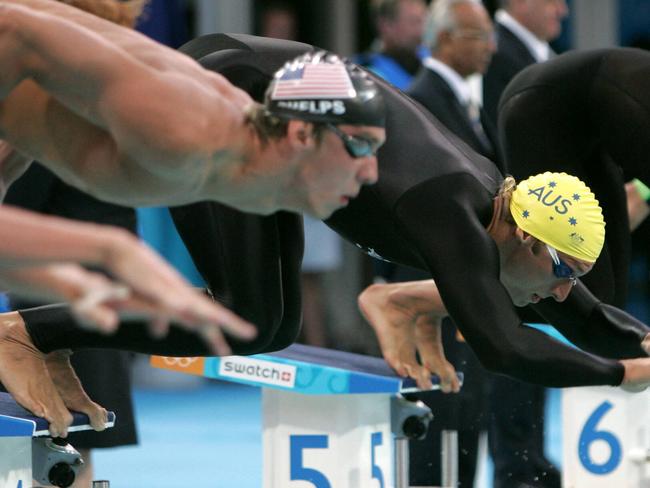
Despite his focus on all things Thorpe out of the water, Phelps knew their rivalry would be settled in the pool. He repeatedly watched videotape of the Australian overtaking Hackett to win the 400m freestyle at the 1998 world championships and was blown away by Thorpe’s economy and power.
“His kick, with his size 17 feet, was like a motor,” Phelps wrote. “I started trying to make my kick more like his, to make it as powerful as I could.” Phelps copied Thorpe’s dolphin kick, which he described as “nothing short of revolutionary”.
“At turns instead of pushing off the wall and then surfacing, he would stay underwater, where was less resistance than up top, for several metres, his feet and legs moving together instead of kicking separately, the motion creating an incredible whip through the water that mimicked the movements of a dolphin,” Phelps noted.
“Because I was naturally a butterflyer, the dolphin kick was relatively easy to pick up. In the IMs, it became an equaliser; even if other guys had a better breaststroke, I could use the dolphin on the turns. If they were getting tired on that final leg, I still had something to unleash.”
THE RIVALRY
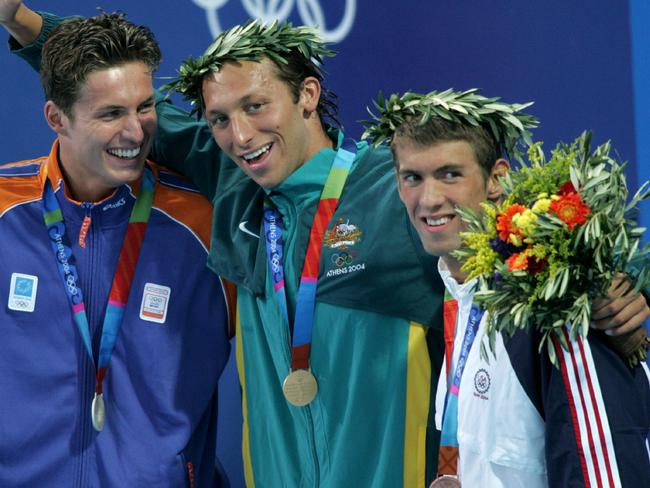
Phelps had begun to close the gap on Thorpe by 2003. He defeated the Aussie by two body lengths in the 200m individual medley at the world championships in Barcelona, but didn’t enter the 200m freestyle, which Thorpe claimed in emphatic style.
But the American knew he’d need to master Thorpe’s pet event if he was going to surpass Spitz — and so he added the distance to his schedule at the US Olympic trials ahead of the Athens Games in 2004. After qualifying in six individual events, Phelps decided to drop one.
“We had all of 24 hours to decide; USA Swimming needed to finalise its roster. The 200 back or 200 free,” Phelps wrote. “The 200 free. I wanted a shot at Ian Thorpe.”
Phelps describes the 200m freestyle final in Athens — which featured an all-time great field of him, Thorpe, defending Olympic champion Pieter van den Hoogenband and Hackett — as the defining race of his career. He set an American record but was unable to catch Thorpe, who finished clear of van den Hoogenband. “I stepped up and raced the best,” Phelps wrote.
“I found out I was good but, in the 200m free, not good enough. I had work to do.”
The defeat denied Phelps the opportunity to match Spitz’s record in Athens (he’d finish with six gold medals) but it was the catalyst to his historic performance in Beijing. Video reviews of the race revealed the “Baltimore Bullet” had started too slowly and despite being denied the chance to personally atone for Athens by Thorpe’s 2006 retirement he smashed the world record in Beijing.
THE MEMORIES
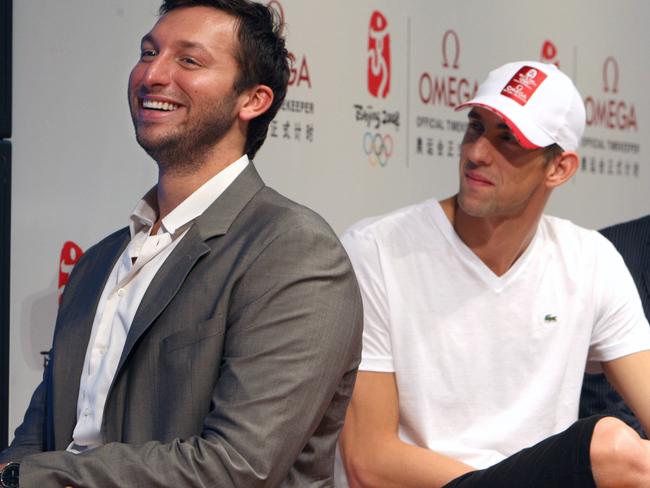
Thorpe will be in the commentary box as Phelps looks to add to his record tally in Rio this week. The American will compete in three individual events — the 100m and 200m butterfly and 200m IM — as well as the relays, which he said have been reinvigorated by the renewed threat of the Australian team.
“The Australians have made a significant charge over the last couple of years from a men’s and a women’s team combined,’’ said Phelps, at a press conference in Rio on Thursday. “There are a lot of the younger guys who have really stepped up and that brings some more excitement to the sport. It kind of brings me back to the memories of Thorpe and Hackett when it was just the two of us, USA versus Australia.” Or Phelps versus Thorpe.


